It would be impossible to move toward the next season without speaking with Jade Flask, whose last season was marked by extremes. She was on one of the best goalscoring runs in her career, topping the league scorer’s chart with 19 goals in 15 appearances and enjoying a return to the forward line with Malta’s national team. However, those highs came crashing down when she tore her anterior cruciate ligament (ACL) at the end of March.
Despite this abrupt end to the season, her performances up to that point caught the eye of the footballing community. She landed the prestigious MFA Footballer of the Year award for the first time and was also recognised by her peers who voted her the MFPA Best Player.
Considering all of this, The Sporting Fan met with Flask to discuss her footballing story to this point. We also discussed the meaning of these awards and her current journey back from the long-term injury that continues to ravage the women’s game.
Early beginnings and development
Eleanor Saliba (ES): What is your first memory of playing football and how did you make the leap to join a club?
Jade Flask (JF): My dad and grandad were football players so as a sport it was always important in the family. I remember going to watch my dad play football when I was young and used to enjoy playing it myself whenever I could, at school or with boys at the swings. I was already really good friends with Shona Zammit (also currently a teammate with Swieqi United and in the national team) and when I was about seven, she had already started playing with Hibernians’ boys and suggested I join her. Of course, I really enjoyed it so wanted to keep going back. I remember my dad was a bit sceptical at the time and spoke with coach Mario Gouder to sort of let him know if he thinks it’s not worth pursuing. However, coach Gouder assured him I had potential and wanted to make sure I kept going to training. I never stopped since then.
ES: Did you have a dream role at a young age and was this perhaps affected by players that you admired growing up?
Jade Flask (JF): When I started with Hibernians the coach used to field me mostly as a striker. I always really enjoyed the offensive part of the game and so the role of a striker was more attractive to me. Of course, this meant I looked up to players who played offensively. Players like Cristiano Ronaldo, Lionel Messi and also Wayne Rooney, amongst others.
Following some time with the Hibs academy, Jade Flask also had a spell in the Birkirkara youth team. She then featured with the senior team at Raiders Luxol for two years, before spending a season with Mosta. Flask then settled at Kirkop United, where she had a strong goalscoring form during the 2014/15 season, tallying 21 goals in 19 appearances. It caught the eye of Hibernians with whom she regrouped in 2015, this time in the senior side. Her spell there led to her first major silverware, including a league title in 2015/16 and three Super Cup victories (2015/16, 2016/17 and 2018/19). She has been playing with Swieqi United since 2019.
ES: Despite starting out as a striker, you have also been deployed in various areas of the pitch, including as a left-winger, left-back and even in the centre of the defence. Who were the coaches that started to employ you in different areas and what was the reasoning at the time?
JF: I started out as a striker with Hibernians and also with the Birkirkara academy. I also played as the forward with the youth sections of the national team (U17 and U19) and scored a few goals. At sixteen years old, coach Pierre Brincat, who was leading the senior national team at the time, handed me my first senior team start against Cyprus as a striker. I was really excited and perhaps a bit anxious, even because I was still adjusting to also playing an 11-a-side game. I remember he substituted me off after thirty minutes, so it was not a game I really shone in unfortunately and as you can imagine I was gutted. Following that, the coach started to try me out in defensive positions, as a centre-back and also as a left-back. I ended up playing mostly as a left-back from then on with the national team, even when coach Mark Gatt took over.
With clubs, at Kirkop United I was still playing as a striker, whereas when I re-joined Hibernians, the coach at the time changed my positions a bit, between midfield and as a left-back. There were a few moments when it felt a bit like I did not really have a position that I owned, but in another sense perhaps the positive was that I had that versatility and over time it seemed that I was played more as a left-back.
However, then last year the coach at Swieqi United at the time, Judith Kuipers, decided she wanted me more on the offensive side of the team. So, I played as a left-winger before she switched me to central striker, which I had not actually played as for quite a long time. It also seemed that the new national team coach Manuela Tesse preferred me in attack, so last season I ended up going full circle in a way and back to being a striker. It was great, as it was something that I always enjoyed as a young player and longed to get back to. Once given the opportunity, following all that time being played in defensive positions, I had an extra incentive to show I could do the role well.
At this point I could not help but light-heartedly mention the parallels between Jade Flask’s journey and that of Rachel Daly. Though it seems that Daly is still fighting that battle with the English national team…
ES: So, based on this, it is safe to say that you have a preferred position to play in…
JF: (laughs) Yes, definitely as a striker. It never changed. I would say over time, when I was played more as a left-back I started to enjoy it a bit more. However, I still always wanted to be in the attack, despite doing my best in defence.
Playing as a left-back with the national team and at club level was a bit different too. In the local league, playing in defense was a bit frustrating at times, whereas I enjoyed it more with the national team, because there was a lot more going on that you had to deal with. However, I still had that gut feeling that I preferred to play as a striker. So a bit of frustration crept in when I was playing in a defensive role because I always had that offensive mindset. I always wanted to get more into the attacking side of things. I am glad I got the opportunity to show what I can do this season.
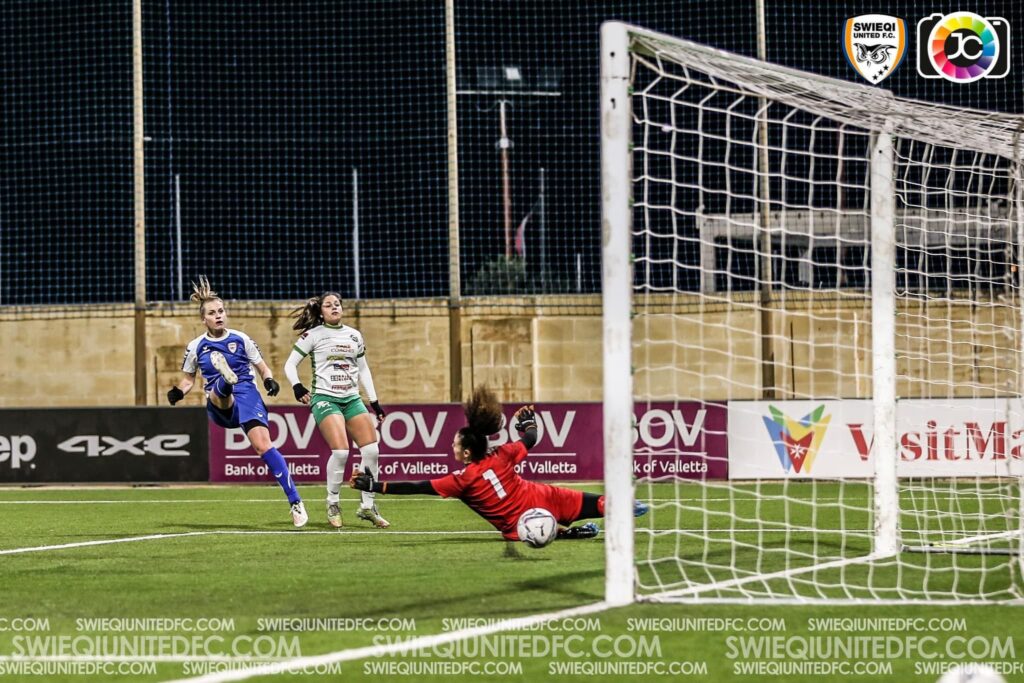
ES: Considering these changes in positions, how did you learn to navigate the different roles on the pitch?
JF: It is not easy when you are changing positions so frequently, you have to adjust to what your teammates are doing and the duties of each role. However, with time and of course support from coaches you get used it. I watch a lot of football as well, which is always useful to learn too.
ES: What would you say is the most underrated thing or something that is misunderstood about playing as a striker?
JF: I think there is a lot that a striker does which is not necessarily directly related to shooting on goal. It is not always about sending a through ball to the striker to shoot and score. Sometimes the striker’s role is to make little movements that perhaps to the untrained eye are not noticeable, but they are useful for the team to create opportunities for other forwards. There are certain runs that one does, which is simply to open spaces for others to move into. In relation to scoring, perhaps the importance of timing runs and the confidence to take a player one on one are both worth noting.
ES: What is your favourite formation to play in?
JF: I think last season we played mostly in a 4-3-3 which suited me quite a bit as the central striker, where I had support from the wings. However, I do not mind a 4-4-2 either, where you would have a partnership in front as a striker.
Living the highs and the lows of last season
It was not the first time that Jade Flask scored more goals than appearances played. She achieved this in the 2014/2015 season with Kirkop United (19 appearances, 21 goals), and in the first season with Swieqi United (2019/2020) (12 appearances, 13 goals). However, this year she extended the margin (15 apps, 19 goals), a number that perhaps would have been higher but for the injury she sustained.
ES: Looking back on these seasons, is there anything that stands out in being able to achieve such great performances in front of goal?
JF: I think it had to do mostly with the positions I was playing in. During my first season with Swieqi United I had a bit more of a mixed role, but with Kirkop United and also during this last season, I was utilised mostly in the front line as the main striker. So based on that I would say it has to do with where I was playing.
ES: You were only denied goals by Birkirkara this season. Looking back at those games, what made Birkirkara particularly difficult to break down as a defence for you as the striker but also as part of the team?
JF: I think considering a lot of my teammates with Swieqi United, we have been playing together for a long time, considering also our time playing together with Hibernians. Looking back, there was a time when we won plenty of games against Birkirkara, but then during these last five-six years Birkirkara have grown stronger and of course more confident. Despite this we always believe we can get the result.
Last season we drew 1-1 against Birkirkara in the opening match of the league. So, when you look at all of the fixtures, I would say we still had positive matches as Swieqi United. However, yes, it is difficult to play against them. As a striker, considering that they have arguably the best two centre-backs in the country, it gives you an extra challenge to contend with. In those matches I would say you also have to be ready for anything and to have the mentality to keep going no matter what happens in the game. So, then I was particularly happy and had goosebumps watching the team fight for the win against them in the (Assikura Women’s) Knockout. It just goes to show how important it is to work as a team.
ES: What would you say is a factor that is crucial in converting a chance to a goal?
JF: I think having confidence is very important because it will affect timing and accuracy in your shot. Positioning and timing of the run (rather than just the shot) are also important, because you may otherwise be offside or not get to the ball in time. However, I think confidence is the most important in converting a chance to a goal.
ES: So, considering last season, the fact that you were trusted to play as a striker after having been wanting to play there for so long gave you an extra boost, especially as soon as your started slotting in the goals…
JF: Yes for sure, having a coach that backs you in that position and seeing yourself doing well of course motivates you to do even better.
ES: What would you say were your favourite goal(s) this year?
JF: The goal I scored with the national team against Luxembourg is something I am really proud of because as a team we really had a good build up to it (you can watch here). Then there was the goal against Raiders Lija in round two, where I received a cross from the wing and hit it first time over the goalkeeper. The goal I scored against Hibernians in the 90th minute in the first round is another I am proud of, where lobbed the defender with the right foot and then struck with my left to score the goal. There are plenty, but perhaps if I had to limit to just a few it would be those.
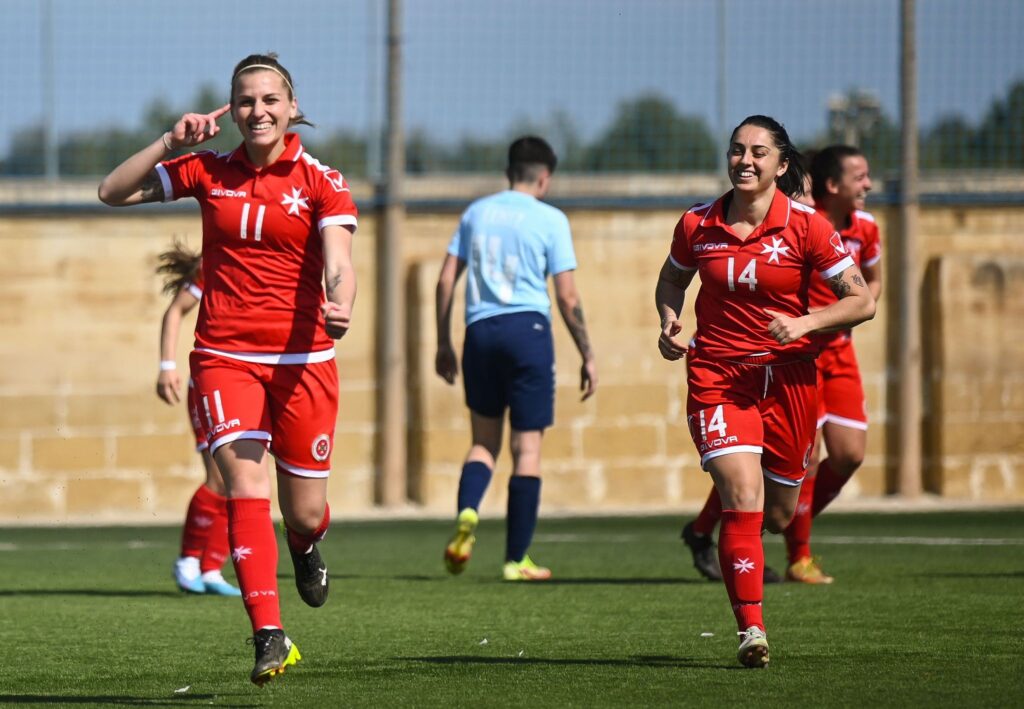
ES: Your season ended rather abruptly as you picked up an ACL injury against Mgarr United in the third game from the last of the league season. In that moment that you went down, what went through your mind and did you know it was the ACL?
JF: Yes, I immediately knew because I felt the knee moving abnormally and the pop is very particular. In fact, I was immediately telling everyone that I did my ACL and they were trying to calm me down. However, I knew the pain was something entirely different to other injuries and the fact I could not walk well after was another giveaway.
ES: Several players in the footballing sphere have spoken about how the long-term injury caught them off-guard because of the sudden change in routine from training and playing in matches, to perhaps rather lonely recovery sessions. In your case, the injury also came on the back of perhaps one of the best seasons of your career to date. How did you process this mentally?
ES: It was not easy to process initially, especially considering the season that I was having. Ending it so abruptly was rather difficult to accept and it is easy to go into a loop where you just keep questioning how this could happen when you were having such a great season. The first two months were quite difficult.
I was trying to do my best to do the exercises that the physio was assigning me, but I also felt the hamstring a bit so had to stop for a week, which was an additional set-back. So, I would say mentally it was challenging. However, I also understood that the longer I rejected what was going on, the longer it would take for me to get going with the recovery and get back to playing. Pitying yourself does not help things. So, you push yourself to fight-back, recover and get back to training with the team.
ES: How has the recovery process been going for you?
JF: It is a steady progression. In July I got to the point where I could run, jump and handle change of direction so I started to get really excited about getting back to playing. I am now training with Swieqi United team on the pitch and gotten to the point where I can dribble with the ball too. It’s funny how going through that changes your perspective. You start to appreciate things you would perhaps take for-granted after playing for so long.
For example, looking back, being in a training session where you are asked to do a lot of running was annoying generally because as a footballer you always want to train with the ball. However, after being away from it for so long, I was so excited to get back into things that I did not even want to stop running. I do not know if others who have gone through the ACL injury themselves experienced the same things, but I would say it has changed my perspective of how important it is to me that I play football. I think after going through a long-term injury like that you appreciate it a bit more.
ES: There is a lot of talk about ACL injuries, with the list exceeding 181 players from top-tier leagues since January 2022, a number which is likely to be just the tip of the iceberg. As you are in the process of recovery, what aspect would you say is talked about but sort of hit on another level once you had the injury yourself?
JF: I think going through it and seeing how many other players are experiencing this, you realise how important it is to carry out more research to understand exactly how we can prevent it. I think we are at a point where we know that women’s anatomy makes us more susceptible to the injury. There is a lot of work being done. For example currently there is this new effort to design football boots specifically for women. The idea is to consider the difference in the anatomy of a woman’s foot, to that of a man, and counter-act its effects. That is just one example of the research being done, there is plenty more.
ES: Is there something that is not talked about but has caught you by surprise about the injury?
JF: I would say I was quite knowledgeable in the sense that I was aware of what the injury is and the recovery involved. The feeling of going through the injury itself is new, but having spoken to so many others who have gone through it, you realise exactly what is going on. I knew what I was facing the minute I went down, perhaps because I had all the major symptoms that others talk about since in my case it was a full tear.
Supporting the team and hinting at a return
ES: Despite not being able to play, it was great to spot you in various games showing your support to the squad, even when the team flourished in the Assikura Women’s Knockout. How was that experience for you?
JF: I think it was impossible not to go. We were heading towards the end of the league season and then of course once the quarter-final Knockout fixture against Birkirkara came round, I knew how important that match was. Winning it was a big victory for the team, it was like a personal triumph for us after having tried so hard to win that fixture for so long. Then of course, in that moment having beaten the defending champions you believe more that you can lift the trophy.
Sitting on the sidelines is stressful and I was really disappointed not to be able to play in the Knockout, but to see them win against Birkirkara and then keep going to win the competition was a fantastic feeling. Those of us coming from Hibernians had not won a trophy since 2018/19 when we won the Super Cup, so we were building towards it for a few years. It made winning the Knockout extra special. I would say all the team contributed towards that, so it was great to see everyone be rewarded. I have a lot of respect for Dorianne Theuma, you could say that from Malta she is my idol, and to see her lift another trophy made the moment extra special.
ES: How eager does it make you to return to the game in search of helping the team lift the league title?
JF: There have been changes in the technical staff, there are new ideas and motivation to build on last season’s success. I of course cannot wait to get back to playing with the team, but also must be patient with the recovery.
ES: Can you give any insight into when we may be able to expect you back on the field?
JF: It is difficult to tell because everyone’s timing is so different, some take nine months, others take six. I have been out for four months, so I would say I have at least three more months. I am hoping to get back in time for round two or maybe in time for the final round, since the league is also starting earlier this year. I think the recovery is encouraging so far, but of course you do not want to rush things, so I work with the physio and I trust her judgement.
Awards and advice for the future generation
As noted above, despite the injury set-back, Jade Flask’s efforts prior to it were crowned with the prestigious MFA Footballer of the Year award, as well the MFPA Best Player, besides also forming part of the MFPA Best XI.
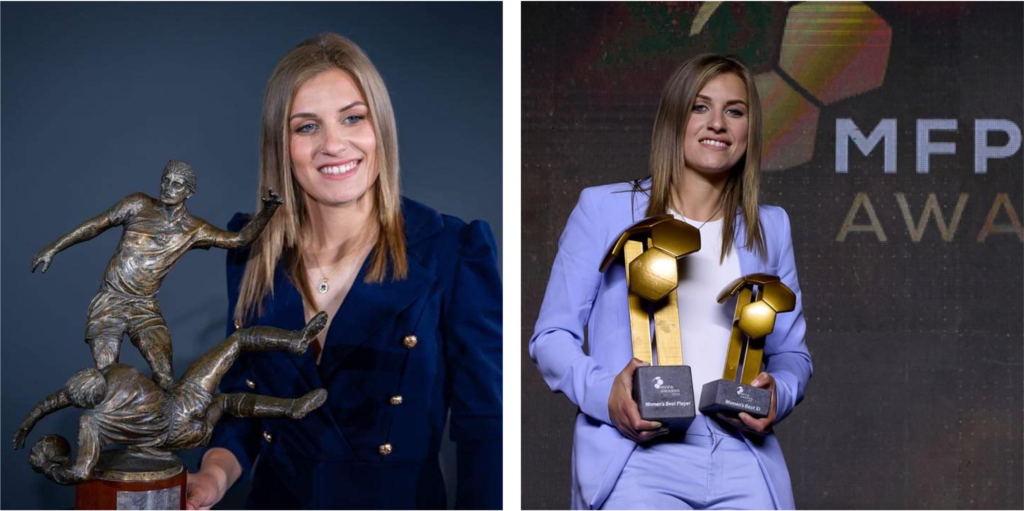
ES: Were these awards something you ever dreamed of achieving and how does it feel to have this recognition from the footballing community as a whole?
JF: I would say being awarded the MFA Player of the Year award is the most prestigious award you can win as a football player in Malta, so it definitely means a lot to me and would say that winning it was a dream of mine. I believe that even winning the Player of the Month award is also something that is important, so then to get an award that considers you the best player over a whole season is even more meaningful. I was shortlisted in the top three in another season and that already meant a lot. The fact that players and also the coaches voted for me to win both the MFPA Best Player and the MFA Footballer of the Year awards this year means a lot to me and made me very happy.
Although I knew that I was having a good season, you never know whether it is enough to win the award and of course the injury ended things early. I was gutted because it meant that I could not help the team in that last part, especially the Knockout which is a cut-throat tournament. Even though I scored nineteen goals, I could not have done it without the team. So, ultimately it is the collective effort that leads to the results, and I also owe this to them.
ES: As MFA Footballer of the Year and as MFPA Best Player, what is your advice to those young ones just starting out and striving to earn these honours themselves one day?
JF: I would say sport is a fantastic thing and that if you want to do something, you should definitely go for it. It is important to believe in yourself because there will always people who doubt you and that may also reduce your confidence. For example, getting dropped to the bench from the starting eleven can demoralise you, but you can always try to use it as motivation to show what you can do with the minutes you get on the pitch. There will be set-backs but if you truly want to achieve something you must learn to fight back and in doing so, you will always find a way.
I would like to thank Jade Flask for taking the time to sit with me to be able to bring you this feature. I look forward to see her return on the pitch, while wishing her the very best in her recovery.
Thank you for reading. If you enjoyed this please consider sharing it with a friend who you think would enjoy it. You may also want to read other interviews from the ‘Spotlight‘ series.
Lead Image: Malta FA
Follow The Sporting Fan on social media: Instagram ~ Facebook ~ X
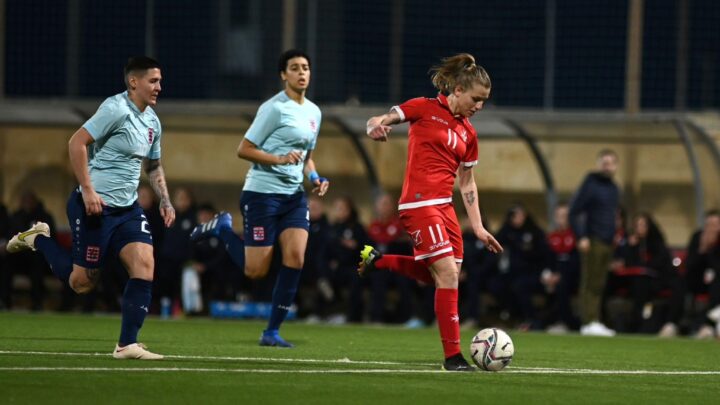
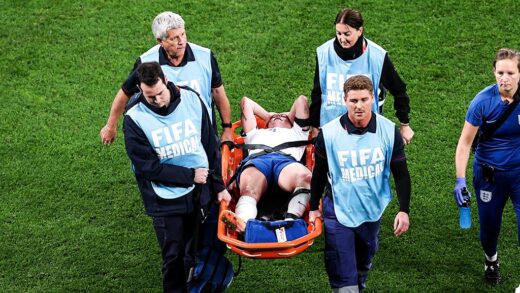
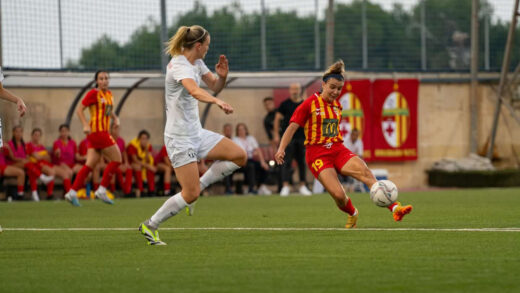
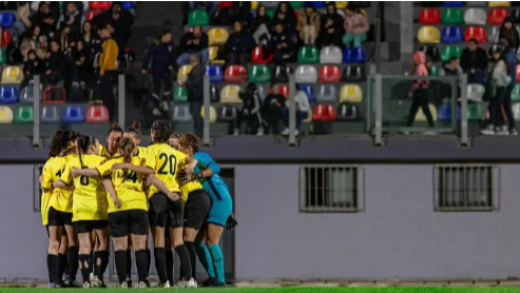
1 Response
[…] their captain Dorianne Theuma. She is joined by compatriots, midfielder Shona Zammit and forwards Jade Flask and Mariah Sciberras, all of whom could make an appearance and also bring title pedigree to the […]